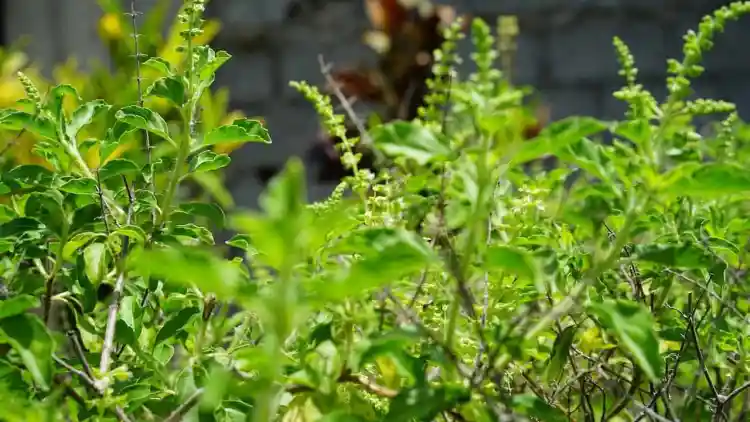Tulasi – Holy Basil is a sacred plant in Hindu culture, revered for its medicinal properties and spiritual significance. It is also known as “Basil” in English and has been used for centuries to treat various ailments. This aromatic herb is a powerhouse of nutrients and antioxidants, making it a valuable addition to your diet.
Benefits of Tulasi – Holy Basil
Tulasi – Holy Basil offers a wide range of health benefits, including:
- Boosts Immunity: Tulasi is rich in antioxidants that help strengthen the immune system, making it more effective at fighting off infections.
- Reduces Stress: The adaptogenic properties of Tulasi help manage stress and promote relaxation, reducing anxiety and improving overall well-being.
- Improves Heart Health: Tulasi has been shown to lower cholesterol levels and regulate blood pressure, reducing the risk of heart disease.
- Aids Digestion: Tulasi helps improve digestion by stimulating the production of digestive enzymes and reducing inflammation in the gut.
- Anti-inflammatory Properties: Tulasi has potent anti-inflammatory properties that can help reduce pain and swelling associated with various conditions.
- Antioxidant Powerhouse: Tulasi is packed with antioxidants that protect cells from damage caused by free radicals.
- May Help Manage Diabetes: Some studies suggest that Tulasi may help regulate blood sugar levels, making it beneficial for people with diabetes.
- Anti-bacterial and Anti-fungal Properties: Tulasi has natural antibacterial and antifungal properties that can help fight infections.

How to Use Tulasi – Holy Basil
Tulasi – Holy Basil can be used in various ways, including:
- Cooking: Add Tulasi leaves to your favorite dishes for a unique flavor and added health benefits.
- Supplements: Tulasi is available in capsule or tablet form as a dietary supplement.
- Topical Application: Apply Tulasi paste or oil to the skin to treat skin conditions.
Here’s a simple guide on how to make Tulasi tea:
Ingredients:
- Tulasi leaves
- Water
- Honey or sweetener (optional)
Instructions:
- Boil water: Heat water in a kettle until it comes to a boil.
- Add Tulasi leaves: Place a handful of Tulasi leaves in a cup or mug.
- Pour hot water: Pour the boiling water over the Tulasi leaves.
- Steep: Let the tea steep for 5-7 minutes, or until the desired strength is reached.
- Strain: Strain the tea into a clean cup using a fine-mesh strainer.
- Sweeten (optional): Add honey or your preferred sweetener to taste.
- Serve and enjoy: Your Tulasi tea is ready to be enjoyed!
Tips:
- For a stronger flavor, use more Tulasi leaves.
- Experiment with different steeping times to find your preferred strength.
- Add a slice of lemon or a pinch of ginger for added flavor.
- You can also make iced Tulasi tea by letting the tea cool completely and adding ice cubes.
Enjoy your refreshing and aromatic Tulasi tea!
Growing Tulasi – Holy Basil
If you have a garden, you can easily grow Tulasi – Holy Basil at home. It is a low-maintenance plant that thrives in warm, sunny conditions. Here are some tips for growing Tulasi:
- Choose a Sunny Location: Tulasi needs at least six hours of sunlight per day.
- Well-Draining Soil: Use well-draining soil to prevent root rot.
- Regular Watering: Water Tulasi regularly, but avoid overwatering.
- Pruning: Prune Tulasi regularly to encourage growth and maintain its shape.
Spiritual Significance of Tulasi – Holy Basil
In Hinduism, Tulasi – Holy Basil is considered a sacred plant with deep spiritual significance. It is believed to be an incarnation of Goddess Lakshmi, the goddess of wealth and prosperity. Tulasi plants are often grown in Hindu homes and temples, and they are used in various religious rituals.
Tulasi – Holy Basil is a versatile herb with numerous health benefits. It is a natural remedy for various ailments and a valuable addition to any diet. Whether you are looking to improve your health, reduce stress, or connect with your spiritual side, Tulasi – Holy Basil is a wonderful plant to consider.





